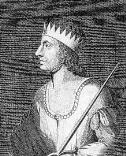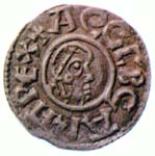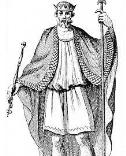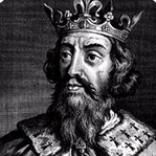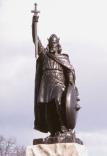See also
- Egbert KING OF WESSEX's parents: Ealhmund KING OF KENT ( -786) and (Daughter of Aethelbert II, King of KENT) ( - )
Egbert KING OF WESSEX (770-839)
1. Egbert KING OF WESSEX, son of Ealhmund KING OF KENT ( -786) and (Daughter of Aethelbert II, King of KENT) ( - ), was born in 0770 in Wessex. He died on 4 February 0839 in Cornwall. He was buried in Winchester Cathedral. He married Redburga.
reigned from 802-839.
Egbert (also Ecgbehrt or Ecgbert) (c. 770 — July 839) was King of Wessex from 802 until his death. Under Egbert, Wessex rose to become the most powerful of the Anglo-Saxon kingdoms, overthrowing the supremacy of Mercia.
A somewhat difficult question has arisen as to the parentage of Egbert. Under the year 825, the Anglo-Saxon Chronicle states that in his eastern conquests Egbert recovered what had been the rightful property of his kin. The father of Egbert was called Ealhmund, and we find an Ealhmund, king in Kent, mentioned in a charter dated 784, who is identified with Egbert's father in a late addition to the Chronicle under the date 784. It is possible, however, that the Chronicle in 825 refers to some claim through Ine of Wessex from whose brother Ingeld Egbert was descended.
After the murder of King Cynewulf in 786, Egbert may have contested the succession, but the throne went to Beorhtric, an ally of Offa of Mercia. Starting probably in 789, Egbert went into exile after being expelled by Offa and Beorhtric. He spent this exile with the Franks on the continent, and although it is said to have lasted three years, some historians have suggested that this period may have actually lasted thirteen years (789–802), as this would account for Egbert's whereabouts during the whole period preceding Beorhtric's death.
Beorhtric ruled subject to the Mercian kings (Offa and, from 796, Coenwulf), and Egbert probably sought greater independence for Wessex. He was acknowledged as king by the West Saxons following Beorhtric's death in 802, but on the same day as his accession to the throne, Æthelmund, earl of the Hwicce, led a raid into Wessex. Æthelmund was defeated and killed by Weoxtan, earl of Wiltshire, who also lost his life in the battle.
In 815 Egbert ravaged the whole of the territories of the West Welsh, which probably at this time did not include much more than Cornwall; it is probably from his reign that Cornwall can be considered subject to Wessex. The next important occurrence in the reign was the defeat of Beornwulf of Mercia at a place called Ellandun in 825. After this victory, Kent, Surrey, Sussex and Essex submitted to Wessex; while the East Anglians, who rose against Mercian rule and slew Beornwulf shortly afterwards, acknowledged Egbert as overlord. In 829 the king conquered Mercia, and Northumbria accepted him as overlord after refusing to fight his forces at Dore (now a suburb of Sheffield). In 830 he led a successful expedition against the Welsh, and it was in the same year that Mercia regained its independence under Wiglaf, although it is uncertain whether this was achieved through a rebellion or was the result of a grant by Egbert to Wiglaf. In 836 Egbert was defeated by the Danes, but in 838 he won a battle against them and their allies the West Welsh at Hingston Down in Cornwall.
Egbert married Redburga, a Frankish princess (possibly a sister-in-law of the emperor Charlemagne), and had two sons and a daughter. Egbert died in about 839, and was buried at Winchester. He was succeeded by his son, King Ethelwulf of Wessex.
The image of Egbert is an imaginary portrait drawn by an unknown artist.
Redburga and Egbert KING OF WESSEX had the following children:
| +2 |
Second Generation
2. Athelwulf KING OF WESSEX, son of Egbert KING OF WESSEX and Redburga, was born in 0795 in Aachen. He died in 0858. He married Osburh.
reigned 839-858.
During his reign Aethelwulf had to content with the growing threat of Danish invasion. In the first half of the ninth century Danish raids had been fierce but not prolonged, but in 850 a sizable army overwintered in England for the first time. Aethelwulf defeated it in the following year at Aclea in Kent. He was clearly a capable military leader for in 853 he was called upon by Burgred of Mercia to defeat the Welsh, but it is likely that he was personally more interested in ecclesiastical matters because in 855 he set of for Rome for a year, leaving his eldest son Aethelbald as ruler of Wessex.
On his way back he was a guest at the court of Charles the Bald, King of the West Franks, and on 1 October 856 he married Charles's 13 year old daughter, Judith. It was probably while in France that he learned of Aethelbald's intention to continue to rule Wessex, despite his father's homecoming. Aethelwulf chose to accept a division of his kingdom, leaving Wessex to his son and taking southeast England for himself. He died in 858.
Four of Athelwulf's sons became kings: Aethelbald, Aethelberht, Aethelred and, most famously, Alfred.
Though apparently one tenth of the Kingdom of Wessex was given to the Church, King Athelwulf was really making a grant out of public land. Such a grant was an actual conveyance of real property rather than a gift of a tithe of the produce of the land.
For which cause, I, Athelwulf, king of the West-Saxons, with the advice of my bishops and nobles, for a remedy thereof have adopted the wholesome expedient of granting forever some portion of my kingdom to God and the holy Mary, and all saints; to wit, a tenth part of my land, free and quit of all secular services, king's tribute both great and small, and the taxations we call witeredden; and for the good of my soul and the remission of my sins, let it be wholly free for the service of God alone, exempt from military service, the building of bridges and castle-ward, to the end that prayers may ascend without ceasing unto God for us, and so much the more diligently as we in aught remit the services of those who offer them....
This charter of donation was written in the year of grace 854, in the fourth indiction, of the ninth day of November, in the city of Winchester, before the greater altar of the blessed apostle Peter.
Osburh and Athelwulf KING OF WESSEX had the following children:
| +3 |
Third Generation
3. Alfred the Great KING OF WESSEX, son of Athelwulf KING OF WESSEX and Osburh, was born in 0849 in Wantage, Berks. He died in 0899. He was buried in Winchester. He married Ealhswith.
reigned 871-899.
Alfred the Great, King of Wessex from 871 to 899, is probably the most famous of the Saxon kings because a large amount of information was written about him. His life was documented by a Bishop called Asser, but this account may not be entirely true. Alfred was the sixth child of Athelwulf. He had four elder brothers (Athelstan, Athelbald, Athelbert and Athelred) and one elder sister Athelswith. Alfred visited Rome twice when he was child to spend time at the court of Pope Leo IV and he spent time at the Frankish court of Charles the Bald. The foreign courts he visited may have been the model on which he based his own court when king. Alfred's elder brothers became kings of Wessex in succession after the death of their father.
Viking Invasions
Athelred became king of Wessex in 865 and Alfred became his deputy. In 868 Alfred and Athelred were assisting the King of Mercia whose lands were being attacked by the Danes. The Danes accepted payment to leave. Athelred and Alfred held the Danes off until 871 when after Alfred defeated the Danes at Ashdown but lost subsequent battles. Athelred was wounded and died of his injuries. Although Athelred had sons they were too young to rule and so Alfred succeeded his elder brother as King of Wessex.
The Marshes
His control lasted until 878 when a Viking army led by Guthrum attacked Alfred's court at Chippenham in the middle of winter. The Saxons were dispersed into marshes around Athelney where they could hide and regroup. Alfred began a period of guerrilla warfare against the Danes from his base in the marshes. The story of Alfred and the burnt cakes probably took place while Alfred was in hiding from the Danes and while he was in disguise. Alfred built up an army including men from Somerset and Wiltshire and arranged for them to meet at Selwood. The large army was then able to overpower the Danes at the battle of Edington. After the battle Guthrum, the leader of the Danes, agreed to be baptised as a Christian by Alfred and agreed to a peace treaty.
Reorganisation
After the battle of Edington, although there were smaller raids by the Danes, Wessex moved into a period of relative peace that lasted for the remainder of his reign. Alfred set about creating a series of fortified villages known as burghs. He created a standing army and ensured there were smaller forces of men to provide support at a local level. He also created a small navy.
Learning
Alfred dedicated a lot of time to improving his own knowledge and the knowledge of his people. He organised the translation of many works of literature from Latin. He was involved with the Anglo-Saxon Chronicles (Click here to see the Anglo-Saxon Chronicle index page), ordering copies to be made and their distribution to major abbeys. When Alfred died his son Edward became King of Wessex.
Ealhswith and Alfred the Great KING OF WESSEX had the following children:
| 4 | Edward the Elder KING OF WEST SAXONS ( -924). Edward died in 0924. |
| 5 |
